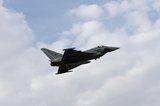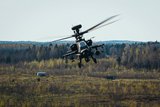Why the US would struggle to overcome Russia’s nuclear anti-satellite weapon
A Falcon 9 rocket launching 24 satellites from Space Launch Complex 40 at Cape Canaveral Space Force Station, Florida. (Photo: US Space Force)
The recent announcement that Russia has been working on a nuclear on-orbit anti-satellite (ASAT) weapon has shed light on US concerns about succeeding in contested space scenarios and raised questions about whether the Pentagon is prepared to overcome an attack from this type of capability.
Although the National Defence Authorisation Act (NDAA) for FY 2024 includes more than US$5 billion investment in space and satellite facilities, systems and technologies over the current fiscal year, defeating attacks of atomic-capable platforms in the domain would be complicated for the US Department of Defense (DoD).
Speaking to Shephard, Kari Bingen, director of
Already have an account? Log in
Want to keep reading this article?
More from Digital Battlespace
-
![Babcock nears first customer for Nomad AI translation tool]()
Babcock nears first customer for Nomad AI translation tool
Nomad can provide militaries with real-time intelligence, saving critical time on the battlefield.
-
![AUSA 2025: Israel’s Asio Technologies to supply hundreds of improved Taurus tactical systems]()
AUSA 2025: Israel’s Asio Technologies to supply hundreds of improved Taurus tactical systems
Taurus operates alongside the Israel Defense Forces’ Orion system which supports mission management across tens of thousands of manoeuvring forces, from squad leaders to battalion commanders.
-
![AUSA 2025: Kopin pushes micro-LED plans as China moves faster]()
AUSA 2025: Kopin pushes micro-LED plans as China moves faster
The plan for the new displays follows fresh investment in Kopin’s European facilities by Theon and an order for head-up displays in fielded aircraft, with funding from the US Department of Defense.
-
![AUSA 2025: Persistent Systems to complete its largest order by year’s end]()
AUSA 2025: Persistent Systems to complete its largest order by year’s end
Persistent Systems received its largest ever single order for its MPU5 devices and other systems earlier this month and has already delivered the 50 units to the US Army’s 4th Infantry Division.
-
![Aselsan brings in dozens of companies and systems under the Steel Dome umbrella]()
Aselsan brings in dozens of companies and systems under the Steel Dome umbrella
Turkey has joined the family of countries attempting to establish a multilayered air defence system with government approval in August 2024 for the effort landed by Aselsan. Dubbed Steel Dome, the programme joins Israel’s Iron Dome, the US Golden Dome, India’s Mission Sudarshan Chakra and South Korea’s low-altitude missile defence system.


























